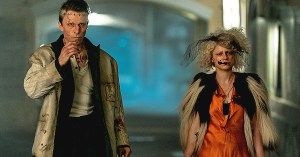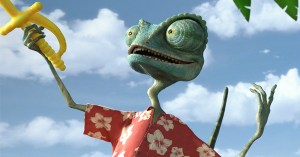Perchance to Electric Dream: A Curious Chat with Spike Jonze
The director of Her performs impromptu lavender therapy, phones a friend, and occasionally discusses his new movie.
“You’re gonna lie on the bed,” Spike Jonze says to me. “It’s part of your therapy.”
Not too many interviews begin with such a peculiar request. We’re in a suite at New York’s Crosby hotel, presumably to do a press interview for Her, Jonze’s near-future romance between a man and his computer’s operating system. I hadn’t expected to find myself lying down, being examined by its director.
Jonze produces a small bottle from the hotel bathroom, while I lay, arms folded, eyes closed. “This is a calming mist,” he says, spritzing and fanning its lavender contents around the bed. “How’s that feel?”
Then, leaning in, with an almost subliminal whisper: “What’s your first question?”
“My first question is… ” I pretend to snore, loudly. Jonze laughs.
This isn’t a regular interview. But then, Spike Jonze isn’t exactly a regular guy. Scampering around the hotel suite in a tailored suit, button-up shirt and his signature skater sneakers, he’s more like an excitable 12-year-old eager to show off his latest project than the 44-year-old director of Being John Malkovich, Adaptation and Where the Wild Things Are. It’s one of the keys to Her‘s success: as sincere and serious as the emotions threaten to get, the movie’s also infused with the sensibility of the guy who co-created Jackass and directed music videos for the Beastie Boys.
Jonze doesn’t like to do video interviews. It’s a relief to us both.
I’m glad you hate video interviews. They’re the worst.
Jonze: [Laughs.] You don’t get to lay down on a bed in a video interview.
You get to look paralyzed as a bright light burns out your eyes. And it’s like, “Hey, boxers or briefs, Spike Jonze?! Can you give me a high five?!”
Jonze: I did it on Being John Malkovich and I don’t think I said anything. I don’t think I said anything at all. I don’t know; I was too self-conscious.
Jonze takes out his iPhone and snaps a picture. I’m still lying on the bed, the diffuse light of New York fall mingling with the traces of lavender mist. I’m reminded immediately of a scene in Her.
One of my favorite shots in the film is when Joaquin Phoenix is lying on the bed staring into the swirling dust particles, and “Samantha” is talking about disappearing into the spaces between. It’s a such a perfect synthesis of sound and image. What inspires something like that moment?
Jonze: Thanks. I don’t know, I can’t because it’s hard… I’m hesitant to wanna explain that much stuff. But I can say, one of the things that I think is worth talking about — or maybe it’s not even worth talking about — but at least for me seemed important to talk about, in terms of the movie, is I think that, you know, something you said earlier in terms of our attachment to our devices; I think that the movie is, to me at least, like our relationship with technology is kind of the setting for the movie, as opposed to what the movie is necessarily about.
I think that the movie, to me, is more about our relationship to each other, and our need for intimacy and connection, and the difficulties within ourselves that make that challenging — and the limitations within ourselves that prevent intimacy or connection; when it’s that thing we need, maybe the most. And I think those are timeless things. That kind of loneliness and longing and need for connection, and what connection means and what intimacy means to us. So I think that the parts that are about technology and the parts that are about the way we’re living in this modern world are sort of just the modern set of complications.
Her is different in that, in many near-future films, technology has run amok or is dystopian in some form, and here technology is benign and user-friendly — even though it can cultivate loneliness. What’s your relationship to technology? Do you see it as a good thing as it progresses?
Jonze: I don’t have a good answer for that ’cause I think it’s a complicated question, and I feel like those are the sort of questions the movie’s asking. I don’t feel like I have a good sound bite for that. [Laughs.] I made a movie about it. I spent three years making a movie about that.
Let me ask you this then: Do you think high-waisted trousers for men are really gonna catch on?
Jonze: [Laughs.] I tried them on, they were comfortable! I tried them on when we were doing fittings. I guess that, I don’t know… [A publicist’s phone rings; Jonze laughs, distracted.] I’m thinking about 20 different things now; that phone ringing, that building… yeah, I don’t have a good answer on the future. In terms of making a movie we were not trying to make a predictive movie about the future, we more let ourselves be free to create the future that we wanted to set the story in, and the future that felt right for this story.
Something that struck me watching Her — and I don’t know if it’s a wild comparison or everyone’s already mentioned it — was its sense of alignment with Blade Runner; the near-future, faux-Eastern Los Angeles, the man in a relationship with an artificial lifeform, and one of the very first things the OS says to him: “Tell me, in a few words, everything about your mother.” They would make a great double-feature.
Jonze: Do they ask about his mother in Blade Runner?
In the very first interview in Blade Runner, the guy says to the replicant, “Tell me about your mother.”
Jonze: Oh, wow! That’s interesting.
Were there other movies on your mind making this, like other A.I. movies?
Jonze: I mean there are definitely movies… I don’t know, as far as A.I. it wasn’t like, “Oh, I’m gonna make an A.I. movie,” it was more, again, those were ideas I was thinking about and am interested in.
Did you ever see Electric Dreams?
Jonze: No, but people have referenced it. It was in the last few months that I keep hearing about it because people have referenced that. Is Electric Dreams where the guy has a relationship with an artificial being?
Not really. It’s more of an early generation desktop computer… I don’t remember what model.
Jonze: So it’s a love story?
It’s a love story between a guy and a girl but his computer becomes obsessed with the girl, too. It’s very sad, actually. And has a good Giorgio Moroder theme.
Jonze: Oh cool. It sounds good.
A friend of mine — upon seeing only the trailer to Her, mind you — said, “So, basically Spike Jonze has ripped off Electric Dreams.”
Jonze: [Laughs.] That wasn’t very nice of your friend.
That’s what I said: “You’ve only seen the trailer.”
Jonze: Wow, harsh. Let’s call her right now. [Laughs.] What’s her name?
Her name’s Phoebe.
Jonze hits dial on my iPhone and switches it to speaker. A robotic female voice-mail service implores him to leave a message.
Jonze: Hey Phoebe, this is Spike Jonze. We were just talking about your critique of the trailer to Her. I didn’t even see Electric Dreams, okay! It sounds like an interesting movie, though, but — come on! — cut me some slack. Gimme a chance. Anyway, hope all is good. Give us a call back. Luke, do you want to say anything?
He’s not happy. The interview was going really well and you upset him.
Jonze: I started crying.
He flipped a table over.
Jonze: I was inconsolable for five minutes!
A beeping indicates a call is coming through.
Jonze: Oh, this is her. Let’s get it. [He answers.] Hey, Phoebe?
Phoebe: Hey, what’s up.
Jonze: Ah, nothing. This is Spike Jonze. I’m sitting here with Luke and we’re doing an interview for a movie. [Beat of silence.] This is Spike. I’m here with your friend.
Phoebe: [Laughs.] Hi… how are you!
Jonze: We’re calling you to give you a hard time because you compared my movie to Electric Dreams.
Phoebe: [Laughs.] I can’t believe you’re doing this!
Jonze: I know! Luke threw you under the bus.
Phoebe: I was giving you a really big compliment, because that’s one of my favorite movies.
Jonze: Oh, he left that part out. Conveniently. I haven’t seen that movie, but Luke just described it to me and it sounds great. I just had to defend myself.
Jonze proceeds to carry on a conversation for four or five minutes, inquiring about her work and how things are in the office. He’s genuinely curious; more at ease exploring a stranger’s life than discussing his own movie. They finally emerge from their chatter.
Phoebe: And how’s your interview with Luke going?
Jonze: Good! I already gave him a spritz of lavender spray that helped him relax.
Phoebe: He can be a little uptight sometimes.
Jonze: [Laughs.] He seems pretty mellow. Alright, I’ll let you get back to work. It was nice to meet you. Be well.
The publicist comes in, telling us to wrap it up.
Jonze: Sorry. We had to call Phoebe. I’m glad we got to call her. That made me feel better. [He stalls the publicist again.] Let’s wrap this. We need a conclusion to this article, don’t you think? Or did that feel like an ending?
I didn’t get to ask you my stupid Hollywood Foreign Press question. [Adopting bad “Euro” accent.] Meeester Jonze, your film is called Her, were you making a statement on the female race?
Jonze: [Laughs.] The female race!
Can you explain the, how you say, origin of zis title?
Jonze: Nobody’s every asked me that.
Why the movie’s called Her?
Jonze: No!
Well I have a million theories.
Jonze: And they’re all right. All million theories are right!.
Did you think about putting periods between “H,” “E” and “R” because, like, it’s a movie about a com-pu-ter.?
Jonze: [Laughs.] I should have consulted you.
Her goes into wide release this week.




